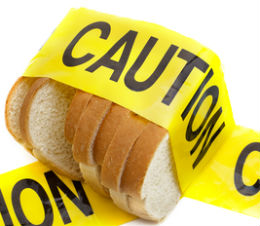Bowel diseases are numerous and unpleasant. Among them, celiac disease is perhaps one of the strangest and least understood. The condition is believed to stem from an abnormal reaction of the small intestines to gluten proteins, which triggers a sort of self-destructive immune response within the upper bowels. Fortunately, there is a growing body of scientific research which supports the use of beneficial probiotics and eating gluten-free foods, as part of your Celiac Disease diet, can help alleviate those uncomfortable symptoms.

Gluten is commonly found in a variety of foods and provides shape and texture. Healthy bodies are able to digest gluten like any other food. In patients who suffer from celiac disease however, gluten is treated very much like a severe allergen, and the presence of even small amounts can trigger intense flare-ups.

Common Foods to Avoid (Unless Labeled Gluten-Free)
- Beer
- Bread
- Candy
- Cereal
- Fries
- Artificial/Processed Meat
- Pastas
- Salad Dressing and Other Sauces
- Potato/Tortilla Chips
How Does Gluten Aggravate Celiac Disease?
The lining of the small intestines are covered with delicate, specialized tissue called villi. The name, which means “shaggy hairs” in Latin, accurately describes their appearance. Villi are responsible for the uptake of vital nutrients from food, and for patients with celiac disease, they can also become a source of agonizing pain.
When gluten proteins become entangled in the intestinal villi of a person with celiac disease, their body’s defense mechanism mistakenly attacks the gluten AND the villi. This interrupts the absorption of vitamins and minerals and can ignite a range of painful side effects. Typical symptoms of celiac disease include abdominal pain due to gas and bloating, constipation and diarrhea, nausea, and vomiting. These can be periodic or constant depending on the individual.
Over time, the diminished ability to process nutrients can also lead to more serious issues such as anemia, depression, fatigue and body aches, even hair loss and stunted growth in children. Read more
No comments:
Post a Comment